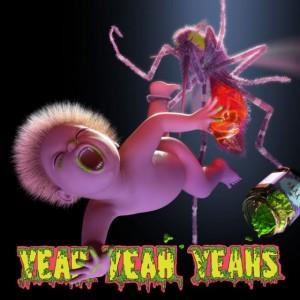The Yeah Yeah Yeahs are a band that have been pretty hard to avoid; for instance, they’ve never gotten much closer than the outer periphery of my own musical tastes, but even I have fairly defined opinions on their albums, their image, and their status as icons of a New York music scene that was blasted into a yuppie-obsessed oblivion sometime around 2009. Try as they might, the Yeah Yeah Yeahs are not the underground icons they once were – they are, in a sense, fulfilling every promise of mainstream success that Lydia Lunch and other No Wavers bitterly claimed they would in the documentary Kill Your Idols. Which is fine – the New York “underground music” scene (co-opted now by landlords and opportunists like Todd P.) is abominably nepotistic at best, and something that the Yeah Yeah Yeahs have done well to keep away from. But now the Yeah Yeah Yeahs are a band in exile from their image but also excommunicated from their origin – 2009’s It’s Blitz! provided a more than robust framework on which the Yeah Yeah Yeah’s might build their sonic furniture, but they have turned it away, like so many do, for the illusory promise of recapturing old glory.
Do not get me wrong: Mosquito is a very interesting sounding album, and it really does not represent a total sonic shift back towards the days of Fever To Tell. The production is murky and weird but there is still a sense of innovation, taking the best of lo fi recording practices and combining it with the all-out, big league bombast of gospel choirs and high-end synthesizers. The problem with Mosquito is really just the songwriting: there are very few hooks worth biting on Mosquito, and save for “Wedding Song” and the Dr. Octagon (Kool Keith) collaboration “Buried Alive” there isn’t much by way of any musical curve-balls either.
On each song Karen O. seems to be trying out a new vocal effect, which provides for the album’s only real sense of movement. “Under the Earth” has a fairly robust post-rock beat that only really grabs your attention as not being as straightforwardly “rock” as the songs that come before it. After finishing the album and going back to “Sacrilege” for a second listen though it almost sounds as though the album is slipping, song by song, into something scuzzier and dirtier – but also more electronic and dance-inflicted. “Always” is a distinctly Beach House-sounding track that does more to exemplify Karen O.’s discomfort with soothing pop songs than to highlight the Yeah Yeah Yeah’s compositional merits. Amidst the foggy, tape-deck production of the scuzzy Mosquito, “Always” almost seems to be missing something as far as fidelity is concerned, as though the song could have done with something more like the It’s Blitz! approach.
This album is both better and worse than it seems like it should be. It certainly isn’t the worst album I’ve heard in quite a while; it’s unoffensive, and it sounds fairly original (by which I mean it sounds like the Yeah Yeah Yeahs). But when I consider the possibility of having to listen to Mosquito again, I can’t help but shudder at the prospect – the album is just kind of boring. The Yeah Yeah Yeahs have always kind of thrived on negative vibes, and for the most part this has been due to their very carefree, “we do what we want” attitude in the face of no wave icons and mainstream music press alike. But look: if you want to make a noisy rock album, then make a noisy rock album; and if you want to make a milky synth-pop album, then make one of those; if you want to do both, then well jeez just do both.
But for the love of god, don’t just half do it.

2.5/5 bars
